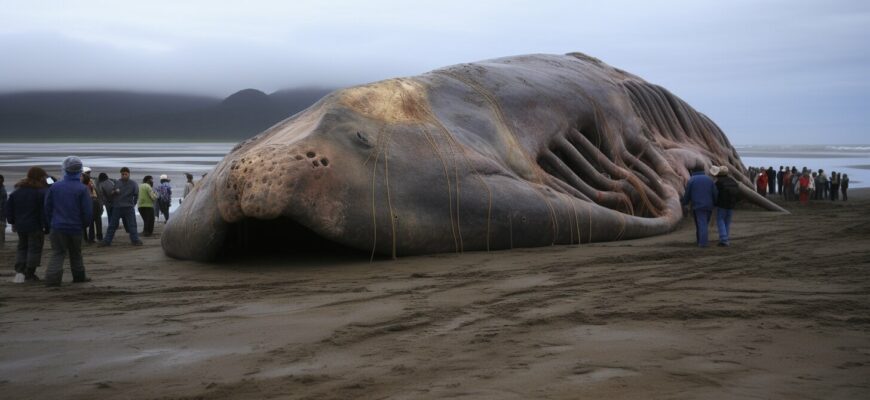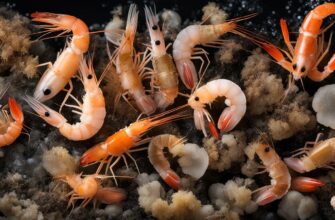Have you ever wondered if whales really explode when they die? The answer is yes, but the reasons behind it may surprise you. In this article, we will take a closer look at this unusual phenomenon.
When a whale dies, the decomposition process begins, leading to the buildup of gases within the carcass. This buildup of pressure can ultimately cause an explosive release, scattering whale remains in all directions.
But why does this happen? What factors contribute to the gas buildup, and why is it sometimes so explosive? Join us as we explore the science and circumstances surrounding whale explosions upon death.
- Key Takeaways:
- The Whale Decomposition Process: A Recipe for Explosions
- The Whale Decomposition Process: A Recipe for Explosions
- Whale Beaching and Explosions: A Deadly Combination
- The Science Behind Exploding Whales: Gas and Pressure
- Reasons for Whale Explosions: External Factors and Internal Conditions
- Conclusion
- Continued Research
- FAQ
- Q: Do whales explode when they die?
- Q: Why do whales explode when they die?
- Q: What causes the decomposition process to lead to explosions in whales?
- Q: Is there a connection between whale beaching events and explosions?
- Q: What is the scientific explanation for gas and pressure buildup in whales?
- Q: What are the external factors and internal conditions that contribute to whale explosions?
Key Takeaways:
- Whales can indeed explode when they die.
- Gas buildup during decomposition can ultimately lead to explosive releases.
- The circumstances surrounding whale deaths can exacerbate the decomposition process, increasing the likelihood of explosion.
The Whale Decomposition Process: A Recipe for Explosions
When a whale dies, the decomposition process begins, and it can be a recipe for explosions. The buildup of gases within the carcass is a significant factor in explosive releases.
During decomposition, microbes break down the whale’s tissues, releasing gases such as methane, hydrogen sulfide, and ammonia. These gases accumulate in the body cavity, causing pressure to build up, leading to a potential explosion.
| Factors Contributing to Gas Buildup in Dead Whales |
|---|
| Warm temperatures can speed up decomposition and gas production. |
| The size of the whale can affect decomposition, with larger whales taking longer to break down and produce more gas. |
| The whale’s species and internal anatomy can also influence gas production, with differences in body structure leading to varying degrees of pressure buildup. |
Once the gas buildup reaches a critical point, the carcass can explode, sending chunks of flesh and blubber flying in all directions. These explosions can occur during beaching events, making them especially dangerous for those nearby.
The Whale Decomposition Process: A Recipe for Explosions
“During decomposition, microbes break down the whale’s tissues, releasing gases such as methane, hydrogen sulfide, and ammonia.”
Exploding whales are not unique to a particular species, and similar post-mortem reactions have been observed in other cetaceans. Although these explosions may seem gruesome, they play an important role in the marine ecosystem, providing nutrients and energy for scavengers and contributing to the ocean’s food web.
- The buildup of gases is a significant factor in post-mortem explosions in whales.
- Warm temperatures, size, species, and internal anatomy all contribute to the buildup of gases.
- Exploding whales are not unique to a particular species and play a significant role in the marine ecosystem.
Whale Beaching and Explosions: A Deadly Combination
The connection between whale beaching events and explosions can be a deadly one. When whales become stranded on land, it can exacerbate the decomposition process that occurs after their death. This can lead to the potential for explosive reactions.
One reason for this is that when whales beach themselves, they are often left exposed to the sun and wind, which can speed up the decomposition process. In addition, the buildup of gases within the body can be more rapid due to the lack of water to help dissipate the heat generated during decomposition. As a result, the pressure within the carcass can increase, leading to a greater likelihood of explosion.
Another factor to consider is the location and size of the stranding. If a whale beaches itself in a small cove or bay, the gases released during decomposition can become trapped, leading to a buildup of pressure and an increased risk of explosion. This is particularly true in areas with shallow water, where the stranding can occur closer to the shore.
Lastly, the stress of being stranded on land can also have an impact on the decomposition process. Stress can cause the release of hormones that can speed up the metabolism and decomposition of the whale’s tissues. This can lead to more rapid gas production and an increased risk of explosion.
The Science Behind Exploding Whales: Gas and Pressure
When a whale dies, its body undergoes a natural process of decomposition. Bacteria within the body begin to break down the tissues, producing gases such as methane and hydrogen sulfide as byproducts. As these gases accumulate within the body, they can create an immense amount of pressure, leading to explosive consequences.
The buildup of gas and pressure within deceased whales is a well-documented phenomenon in the scientific community. In fact, similar post-mortem reactions have been observed in other marine mammal species, such as porpoises and dolphins. However, the unique physiology of whales may make them particularly prone to such explosive events.
One key factor that contributes to the buildup of gas in decomposing whale carcasses is their large size. Whales can weigh anywhere from several tons to over 100 tons, meaning that there is a significant amount of tissue to break down. Additionally, whales have a specialized respiratory system that allows them to hold their breath for extended periods of time. This means that the lungs of a deceased whale can continue to take in air, providing a steady supply of oxygen to fuel the decomposition process and the production of gases.
Another contributing factor is the depth at which whales typically live. The immense pressure of the ocean at great depths can cause gases to dissolve into the body tissues of living whales. When a whale dies and rises to the surface, the sudden release of this dissolved gas can contribute to an even greater buildup of gas and pressure within the body.
While the exact mechanisms behind exploding whales are still being studied, it is clear that the buildup of gas and pressure within the body is a key factor. By understanding the science behind this phenomenon, scientists can better predict and prevent these events from occurring, ultimately helping to protect these magnificent creatures.
Reasons for Whale Explosions: External Factors and Internal Conditions
Whale explosions can occur due to a variety of factors, both external and internal. While the decomposition process plays a significant role in gas buildup, environmental factors can also contribute to these explosions.
External factors, such as temperature and humidity, can accelerate the decomposition process and increase microbial activity. This, in turn, leads to a faster buildup of gases within the carcass. Higher temperatures, for example, can increase the rate of gas production within the body, leading to a greater risk of explosion.
Internal conditions also play a role in whale explosions. The anatomy of whales, including their thick blubber layers and large size, means that gases can be trapped within the body for longer periods. This increases the pressure within the body, making it more likely to explode upon death.
Furthermore, the type of gases produced during decomposition can also contribute to the likelihood of explosion. Methane, for example, is a highly flammable gas that is produced in large quantities during the decomposition process. This means that if a whale explodes, it can be a dangerous event for nearby humans and wildlife.
Overall, a variety of factors can contribute to the explosion of a whale carcass. By understanding these external and internal conditions, we can better predict and manage the risks associated with these events.
Conclusion
Through our exploration of the exploding whale phenomenon, we have gained a deeper understanding of the science behind it. We have learned that as whales decompose, gases such as methane and hydrogen sulfide are produced, which can build up in their bodies and lead to explosions.
We have also discovered that external factors such as temperature, microbial activity, and beaching events can exacerbate the decomposition process and increase the likelihood of explosions. The internal anatomy of whales, including their large size and unique respiratory systems, can also contribute to post-mortem reactions.
Continued Research
As we continue to study and learn more about the exploding whale phenomenon, we may uncover even more mysteries surrounding these magnificent creatures. Through continued research, we can gain a better understanding of how marine mammals decompose and the factors that influence their post-mortem reactions.
Ultimately, this knowledge can help us better protect and conserve these incredible animals, ensuring their survival for generations to come.
FAQ
Q: Do whales explode when they die?
A: Yes, whales can indeed explode when they die. The buildup of gases within their bodies during the decomposition process can cause explosive reactions.
Q: Why do whales explode when they die?
A: Whales explode when they die due to the decomposition process that leads to the buildup of gases within their carcasses. The pressure from these gases can cause explosive releases.
Q: What causes the decomposition process to lead to explosions in whales?
A: The decomposition process in whales can lead to explosions due to the factors that contribute to the buildup of gases within their bodies, such as microbial activity and temperature changes.
Q: Is there a connection between whale beaching events and explosions?
A: Yes, there is a connection between whale beaching events and explosions. The circumstances surrounding strandings can exacerbate the decomposition process, increasing the potential for explosive reactions.
Q: What is the scientific explanation for gas and pressure buildup in whales?
A: The scientific explanation for gas and pressure buildup in whales involves the biological processes that occur during decomposition. These processes lead to the production and accumulation of gases within the body.
Q: What are the external factors and internal conditions that contribute to whale explosions?
A: External factors such as temperature and microbial activity, as well as the internal anatomy of whales, can influence the likelihood of explosion upon their death. These factors and conditions contribute to the buildup of gases and pressure within the carcass.









